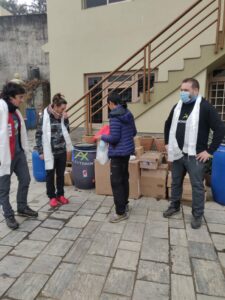The expedition we are carrying out this year has a marked humanitarian and solidarity value. I always try to make it that way, but this year it had to be more than ever. The pandemic generated by COVID-19 has hit all of Nepal very hard. Not so much at contagion level, but at economic level. The people here live largely from tourism and this year, as we all know, we have hardly been able to move from our countries. When I spoke with them on the phone before coming, they all passed the same idea to me: “We are suffering a lot. Everything is stopped and this is unsustainable. People are having a very bad time ”. Worry invaded his words.
I knew, therefore, what we were going to find. This is why, together with EKI Foundation, we got down to work. We had to think about how we could help them. Always within our means, of course. We are a committed but very small team with limited resources. But we had to find the formula. There are no excuses here. Nepal has given me so much and I always feel that I am indebted to them… In a way, I owe it to them.

Well, after looking for formulas with EKI Foundation, we thought we could help them in two different ways: by giving them 60 autonomous light bulbs and by giving them the solar panels we have brought to Manaslu base camp that provide us with all the energy we need in our daily life.
But we needed to put a third protagonist into the equation. Someone to tell us where and to whom to deliver material. Someone who knew first hand and better than anyone Nepalese people’s needs. And here it’s where Iñaki Ochoa de Olza-SOS Himalaya Foundation came in. We got in touch with them and everything was very simple. Our job would be to receive EKI Foundation material and take it to Nepal. So we did it.
During our first week in Kathmandu we met with them and delivered the first batch of products: 60 autonomous LED bulbs, which can work thanks to a solar panel attached to them or which, if desired, can also be turned on with normal electricity (although cuts, as is common in some areas). That is to say, these bulbs have a lithium battery that is charged thanks to the sunlight or the electricity that can arrive. If it gets dark or the power supply goes out, the battery is charged and the bulb continues to work for up to 8 hours. A simple system, but extremely effective. In addition, these bulbs have a USB input and a microjack and the system can be activated with a remote control. A light bulb in a home can mean that girls and boys can study, that their day does not finish with the night.
Once we finish our expedition in Manaslu, we will deliver the second batch of material: solar panels that supply us with energy in base camp and prevent us from having to use generators and consume fuel (without forgetting the environmental impact we are avoiding). But first we have the challenge of climbing a giant of 8,163 meters, and it is not being so easy for us. Eskerrik asko to Iñaki Ochoa de Olza SOS Himalaya Foundation for helping us bring all this material to the areas where it is most needed and to Fundación EKI for making it possible. We are getting renewable energy to reach the most remote places on the planet and helping many families to improve their lives.
